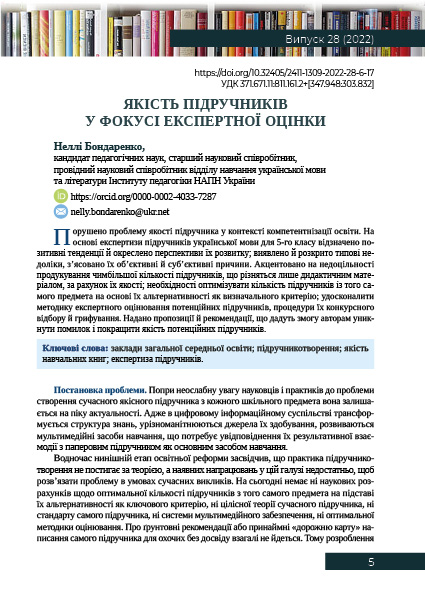
Published 2022-07-20
Keywords
- general secondary education institutions,
- textbook creation,
- quality of textbooks,
- expertise of textbooks
How to Cite

This work is licensed under a Creative Commons Attribution-NonCommercial-ShareAlike 4.0 International License.
Abstract
In the article, the author considers the problem of school textbook quality in the context of modernization of educational content. The urgency of the problem of creating a modern high-quality textbook in view of the transformation of the structure of knowledge in the digital society, taking into account various sources for deepening knowledge and general development of multimedia learning tools is also substantiated. Researchers in the field of education recognize that there is no holistic theory of the modern textbook; there is no standard of the textbook; The method of evaluating the school book is not optimal, there is a need for thorough recommendations for writing a textbook for those authors who do not yet have experience in textbook creation. That is why the development of these aspects requires a rational system approach.
The author characterizes the requirements for a competitive personality, the main role in the formation of which belongs to the textbook. The article reveals the key characteristics of the main means of learning and didactic approaches, principles and categories that form the foundation of competency-based learning.
Scientific works on the problems of theory and practice of textbook creation are analyzed. «White spots» in the development of certain aspects of educational competence that prevent their implementation in the textbook. Factors influencing the effectiveness of the textbook are identified. The parameters according to which the examination of Ukrainian language textbooks for the 5th grade was carried out are presented.
Based on the data of the examination, the positive tendencies are singled out and the prospects of their development are outlined; typical shortcomings were identified, as well as their objective and subjective reasons. The emphasis is placed on the inexpediency of producing a large number of textbooks that differ only in didactic material, and the quality should be better. It is necessary to optimize the number of textbooks in the same subject based on their alternative as a defining criterion. It is necessary to improve the methodology of expert evaluation of potential textbooks and the procedures for their competitive selection. The author provides suggestions and recommendations that will allow authors of school textbooks to avoid mistakes and improve the quality of potential textbooks.
Downloads
References
- Беспалько, В. П. (1988). Теория учебника: Дидактический аспект. Москва: Педагогика, 1988.
- Бондаренко, Н. (2020а). Україна під «новою парасолькою грамотності». Нова педагогічна думка. 2020. № 2 (102), 55–59. http://lib.iitta.gov.ua/id/eprint/721413.
- Бондаренко, Н. В. (2020b). Розвиваємо ключові компетентності: міжпредметний аспект. Українська мова і література в школі, 4, 33–40.
- Бондаренко, Н. В. (2020c). Читацька грамотність українського учнівства: акценти PISA‑2018. Український педагогічний журнал, 2, 96–103. http://lib.iitta.gov.ua/id/eprint/721386.
- Бондаренко, Н. В. (2021a). Ресурсний потенціал уміжпредметнення у компетентнісному навчанні мови. International scientific innovations in human life. Proceedings of the 1st International scientific and practical conference. Cognum Publishing House. Manchester, United Kingdom. 2021, 107–116. http://lib.iitta.gov.ua/id/eprint/726150.
- Бондаренко, Н. В. (2021b). Медіатекст як ресурс осучаснення й збагачення змісту підручника української мови. Проблеми сучасного підручника: зб. наук. праць, 27, 15–26. https://lib.iitta.gov.ua/id/eprint/729474.
- Бондаренко, Н. В.; Васьковская, Е. Е.; Косянчук, С. В. (2021). Диалогизация как ресурс изучения языка в контексте обновления традиционных методов обучения. Humanitarian Balkan Research, 5, 1(11), 10–15. DOI: 10.34671/SCH.HBR.2021.0501.0001. http://lib.iitta.gov.ua/id/eprint/724617.
- Бондаренко, Н. В.; Косянчук, С. В. (2017a). Реформування навчальних програм: більше запитань, ніж відповідей. Український педагогічний журнал, 2, 112–119. http://lib.iitta.gov.ua/id/eprint/712203/BNV KSV 17 UPZh2.pdf.
- Бондаренко, Н. В.; Косянчук, С. В. (2017b). Удосконалення експертизи шкільних підручників. Український педагогічний журнал, 1, 98–103. http://lib.iitta.gov.ua/id/eprint/706610/BNV KSV 17 UPZh 01.pdf.
- Бондаренко, Н. В.; Косянчук, С. В. (2018a). Розвиток життєвих компетентностей старшокласників засобами підручника української мови. Проблеми сучасного підручника. Київ, 21, 44–56.
- Бондаренко, Н. В.; Косянчук, С. В. (2018b). Соціальний аспект формування українськомовної компетентності старшокласників. Гуманітарний вісник Полтавського національного технічного університету імені Юрія Кондратюка. Полтава: ПолтНТУ імені Юрія Кондратюка, 3, 99–113.
- Бондаренко, Н.; Косянчук, С. (2021a). Пропозитивне думання як детермінанта аксіологізації освітнього процесу. Selected aspects of digital society development. Monograph (ed. by T. Nestorenko and A. Ostenda). Publishing House of University of Technology, Katowice, 106–114. http://lib.iitta.gov.ua/id/eprint/725705.
- Бондаренко, Н.; Косянчук, С. (2021b). Класифікаційна модель запитань для реалізації в освітньому процесі. Нова педагогічна думка, 1(105), 12–17. DOI: 10.37026/2520-6427-2021-105-1-12-17. http://lib.iitta.gov.ua/id/eprint/724888.
- Васьківська, О. Є.; Кизенко, В. І. (2017). Стан і перспективи розвитку умінь діалогічного спілкування старшокласників засобами сучасного підручника. Проблеми сучасного підручника: зб. наук. праць. Київ, 18, 5–13.
- Зуев, Д. Д. (1983). Школьный учебник. Москва: Педагогика.
- Кизенко, В. І. (2018). Варіативний компонент змісту освіти в основній і старшій школі: теорія і практика: монографія. Київ: Вид. дім «Слово».
- Кодлюк, Я. П. (2016). Ключові компетентності у змісті підручників для початкової школи. Проблеми сучасного підручника, 17, 182–191.
- Лукіна, Т. О. (2004). Якість українських підручників для середніх загальноосвітніх шкіл: проблеми оцінювання і результати моніторингу. Київ: Академія.
- Підласий, І. П. (1998). Діагностика та експертиза педагогічних проектів. Київ: Україна.
- Топузов, О. (2015). Компетентнісні засади сучасного підручникотворення. Український педагогічний журнал, 3, 36–47.
- Топузов, О. М. (2012). Роль і місце підручника в реалізації компетентнісного підходу до навчання. Проблеми сучасного підручника: зб. наук. праць. Київ: Педагогічна думка, 12, 241–247.
- Трубачева, С. Е. (2011). Трансформація функцій шкільного підручника в умовах компетентнісного підходу. Проблеми сучасного підручника: зб. наук. праць. Київ: Педагогічна думка, 11, 17–22.
- Франсуа-Марі, Жерар; Ксав’є, Рожер. (2001). Як розробляти та оцінювати шкільні підручники. Київ: Анод.
